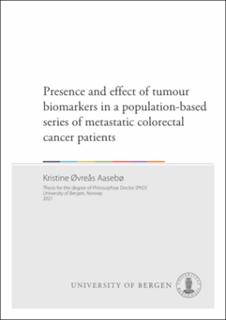Presence and effect of tumour biomarkers in a population-based series of metastatic colorectal cancer patients
Doctoral thesis
Permanent lenke
https://hdl.handle.net/11250/2786994Utgivelsesdato
2021-10-22Metadata
Vis full innførselSamlinger
Sammendrag
Background: Colorectal cancer (CRC) is one of the most common malignancies worldwide, and a substantial group of patients will develop metastases. Survival for metastatic CRC (mCRC) has improved, but mainly for trial patients. Precision medicine is essential to improve survival and avoid overtreatment. Studies of prognostic and predictive markers for mCRC patients are mainly based on highly selected patients in clinical trial cohorts.
Objective: We aimed to report real-world data on the incidence and impact of predictive and prognostic tumour biomarkers in a prospectively collected Scandinavian population-based cohort of mCRC patients.
Methods: Immunohistochemistry and DNA sequencing of tumour biomarkers was performed.
Results: The incidence of tumour microsatellite instability (MSI) and BRAF mutation (BRAFmut) was 7 % and 20 %, and both markers were associated with poor patient outcome. MSI was associated with BRAFmut and patient age, indicated poor response to 1st-line chemotherapy, and few patients received 2nd-line treatment.
Loss of CDX2 expression was identified in a subgroup of tumours, defining patients with poor prognosis and indicated inferior chemotherapy benefit. CDX2 loss defined new prognostic subgroups in BRAFmut and KRAS mutated cases, respectively.
In chemotherapy-treated patients, a high density of tumour infiltrating CD3 lymphocytes and CD68 macrophages were independent good prognostic markers for overall survival. MSI was an independent poor prognostic marker despite high immunogenicity.
Conclusions and consequences: We found a higher frequency of MSI and BRAFmut in this population-based mCRC cohort than previously reported. Patients with MSI tumours were much older and most harboured tumour BRAFmut, in strong contrast to patients in recent clinical trial cohorts. Furthermore, CDX2 status and immune markers beyond T-cell markers are emerging risk assessment biomarkers for mCRC.
Består av
Paper I: Aasebø K., Dragomir A., Sundstrøm M., Mezheyeuski A., Edqvist P.H., Eide G. E., Ponten F., Pfeiffer P., Glimelius B., Sorbye H.: Consequences of a high incidence of microsatellite instability and BRAF‐mutated tumors: A population‐based cohort of metastatic colorectal cancer patients. Cancer Med. (2019) 8:3623–35. The article is available at: https://hdl.handle.net/1956/22628Paper II: Aasebø K., Dragomir A., Sundstrøm M., Mezheyeuski A., Edqvist P. H., Eide G. E., Ponten F., Pfeiffer P., Glimelius B., Sorbye H.: CDX2: A Prognostic Marker in Metastatic Colorectal Cancer Defining a Better BRAF Mutated and a Worse KRAS Mutated Subgroup. Front Oncol. (2020) 10:8. The article is available at: https://hdl.handle.net/11250/2763452
Paper III: Aasebø K., Bruun J., Bergsland C., Nunes L., Eide G. E., Pfeiffer P., Dahl O., Glimelius B., Lothe R., Sorbye H.: Prognostic role of tumour infiltrating lymphocytes and macrophages in relation to MSI, CDX2 and BRAF status: A population-based study of metastatic colorectal cancer patients. The article is not available in BORA.
